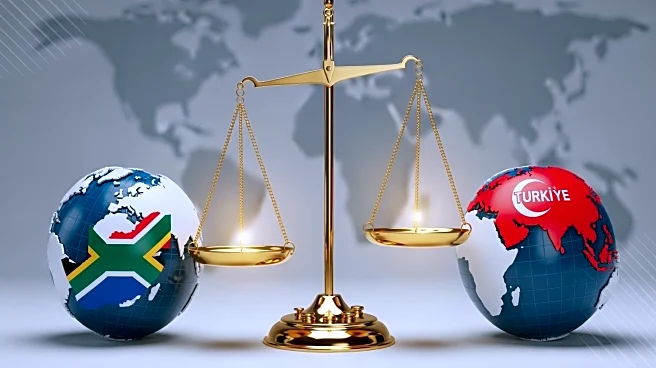What's Happening?
South Africa is reviving its diplomatic and economic relations with Türkiye, as announced by South African Deputy President Paul Mashatile during a visit to Türkiye. This development comes as the two nations
officially activate the Türkiye–South Africa Bi-National Commission, initially agreed upon in 2012. The commission aims to enhance political, economic, and trade relations between the two countries. The renewed focus on Türkiye is partly a response to the impact of U.S. tariffs on South Africa, which have strained Pretoria's relations with Washington. The collaboration emphasizes energy and industrial cooperation, with South Africa planning to expand its energy production and infrastructure, areas where Turkish expertise is expected to contribute significantly. Agreements have been signed to promote skills training, higher education cooperation, and technology transfer.
Why It's Important?
The strengthening of ties between South Africa and Türkiye marks a significant shift in South Africa's foreign and trade policy, moving away from reliance on the U.S. due to tariff pressures. This pivot could lead to increased Turkish investment in South Africa, particularly in the energy sector, potentially boosting South Africa's economic growth and energy independence. The collaboration also reflects a broader geopolitical alignment, as both countries share similar stances on international issues, such as their criticism of Israel's military actions in Gaza. This alignment could influence South Africa's diplomatic relations and trade partnerships, potentially affecting its economic landscape and international standing.
What's Next?
The operationalization of the Türkiye–South Africa Bi-National Commission is expected to facilitate ongoing dialogue and cooperation between the two countries. Future developments may include increased Turkish investment in South African industries and further agreements to enhance trade and economic collaboration. The shift in South Africa's foreign policy focus may also prompt reactions from other international partners, potentially leading to new alliances or adjustments in existing trade agreements. The impact of U.S. tariffs on South Africa's economy and its international relations will likely continue to be a point of discussion and strategic planning.
Beyond the Headlines
The strategic pivot from Washington to Ankara highlights the complexities of international trade relations and the influence of geopolitical factors on economic decisions. South Africa's decision to strengthen ties with Türkiye, despite potential challenges, underscores the importance of diversifying trade partnerships to mitigate the impact of external economic pressures. This move may also encourage other nations facing similar challenges to explore alternative alliances, potentially reshaping global trade dynamics.










